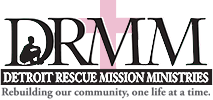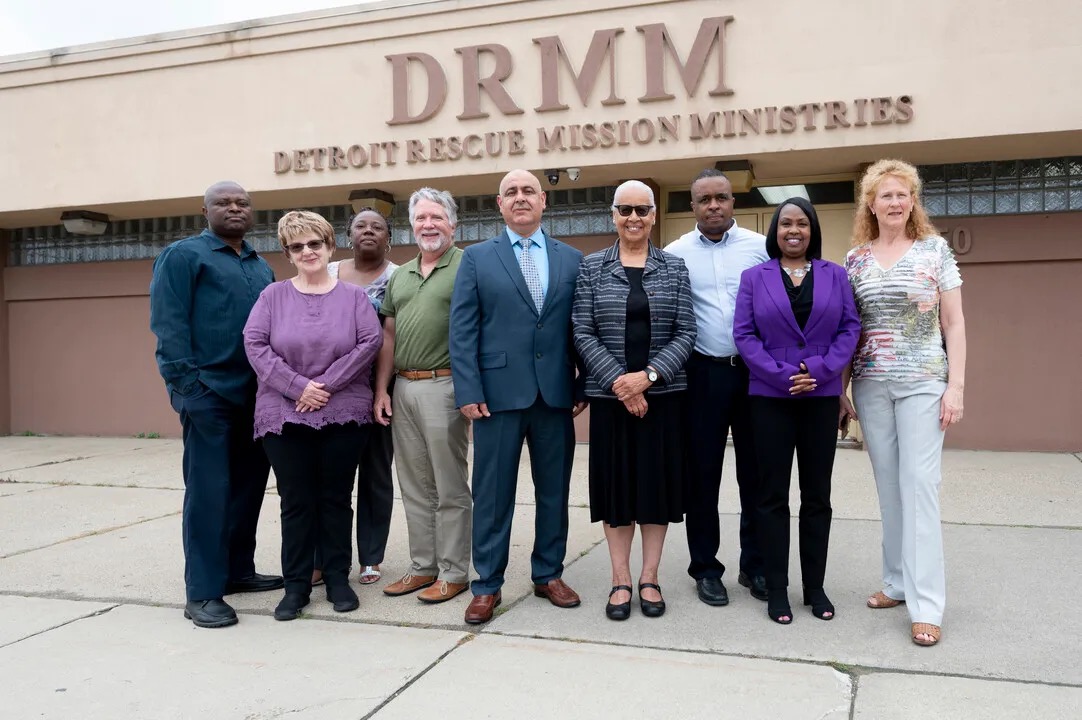DETROIT – Tonight, as is the case every night, more than two thousand homeless people will have a meal — this night, a special Thanksgiving meal — thanks to Detroit Rescue Mission Ministries.
Some of them are homeless through no fault of their own, thrown out by abusers or forced to flee. Some are children; some veterans. Some are victims of alcoholism or drug addiction.
They will also have a clean, safe and dry place to sleep, no matter how crowded the mission (DRMM, for short) — may be. They will also be offered a chance at building a better life. “We never turn anyone away,” said Chad Audi, the man who, without fanfare, has turned what was once little more than a soup kitchen into what is essentially a full-service privately run social service agency.
Though he hasn’t gotten a great deal of attention in Michigan, last year Audi, a genial, modest and self-effacing man, received a global award for being the non-profit CEO of the year.
The magazine CEO Today noted that he had received widespread recognition as a “visionary and dynamic leader who had not only created one of the largest rescue missions in the world, but had quietly also built one of the biggest substance abuse treatment centers in the United States.
But while you might think Chad Audi would have a sense of satisfaction this Thanksgiving, he’s more worried than contented, for several reasons. “This is an odd time for us,” he said in his office near Detroit’s once-infamous, crime-plagued Cass Corridor.
“People think the pandemic is pretty much over, and unemployment is down, and the need is less. But it’s not. Contributions were down 49 percent in October over last year. But the need is actually greater. With the economic upheavals and uncertainties we are seeing people we haven’t seen since (the Great Recession of) 2008,” when many who had never been in serious economic trouble lost their jobs, and then homes.
Working poor and even middle-class families, that is, and that’s happening again now, he said. The pandemic was especially hard for the Detroit Rescue Mission. The mission, which now has 22 sites, had to open new ones and find new space to house people who could no longer be in close proximity to each other.
There were vast added expenses for sanitation equipment and supplies. The virus was devastating to people who were already weak; in addition to a number of clients, nine of DRMM’s full and part-time staff members died.
“Somehow I never got it, though I was here and with the people all the time– you can’t work remotely and serve the public in a job like this. Then, three months ago, when everything is supposed to be over — I got Covid!” he chuckled, shaking his head.
That may be ironic, but what is more so is that this was never the life Chad Audi planned at all. A native of Lebanon, he came to the United States in the 1990s to earn a graduate degree in finance (today, he holds two doctorates.) He was offered a job with a big salary in the private sector, but in the two months before he was supposed to start, he decided it would be good experience to offer to use his financial skills to help a struggling local non-profit whose finances were a mess — the rescue mission.
Within a few weeks, Audi, a committed Christian, decided this was his calling. “I was moved by the fact that it was changing so many lives. You can’t put a price tag on that.” His Middle Eastern father, who you might expect would have been horrified, supported the idea. “He encouraged me to make a difference, not just a living.”
So he decided to stay. He became CEO when he was 27. In the quarter-century since, he has more than quadrupled the size of DRMM, and expanded its reach and services.
Recently, they began a new program in which they offered to do renovations and repairs free of charge for any Detroiter over 90, and were deluged with requests, one from someone who was 102.
The mission is also planning a place where families, including suburban families, who are caring for an elderly family member can leave their loved one for a few days to have a break. They have a facility in Livonia, but face opposition from suburban politicians who, when they see, “Detroit Rescue Mission,” needlessly worry they are planning to bring homeless Detroiters to their community.
There’s another problem, too. “Everyone sees us as a ‘soup kitchen’ and are willing to fund that,” Audi said, adding that what the media and those who award grants don’t seem to grasp is that they have now evolved into a complete social service agency.
But some do get it, like Sophia, a 17-year-old varsity swimmer who was so moved by what the mission does that she did swim-a-thons and raised $1,000 and today helps tutor kids at the shelter.
This year, as last, she volunteered to put together Thanksgiving dinners for those who depend on DRMM. She was deeply moved when, for the first time, she met women and children who actually needed food, and got “a glimpse of what their struggles must be like.”
I don’t know of any organization in Michigan that does more good for more people; you can read more about them, or find more ways to help on their website, DRMM.org, or calling 313-993-4700.



